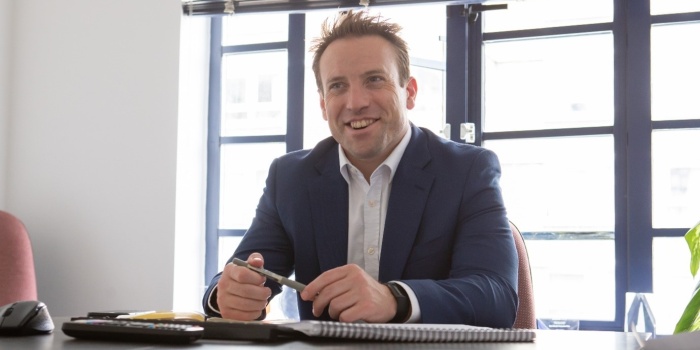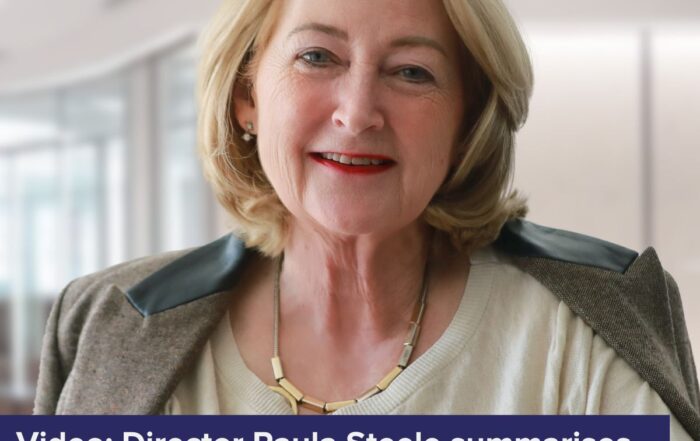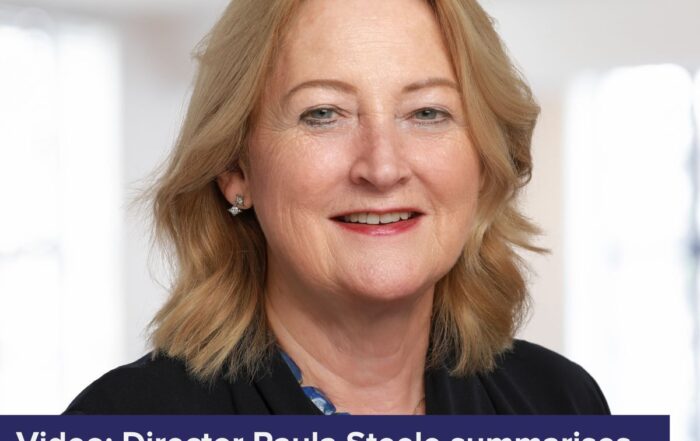Q&A with Ken Maxwell, director at John Lamb Hill Oldridge

In this new series of Q&A articles, you can learn more about our esteemed team members who ensure that our clients receive the very highest level of service.
Ken Maxwell is one of the directors here at John Lamb Hill Oldridge. Since joining the business in 2018, he has helped our high-net-worth (HNW) and ultra-HNW (UHNW) clients to create effective succession plans for their wealth and family businesses.
Read on to learn more about Ken’s background, how he helps his clients, and some of the favourite parts of his role.
Q: Could you tell us a little bit about your background and experience prior to working at John Lamb Hill Oldridge?
A: I studied accounting and finance at the University of Exeter which I thoroughly enjoyed. Although the course had some interesting modules, I had come to the conclusion fairly early on that I did not wish to pursue a career in this field, much to the disappointment of my father. Instead, I made the decision to enter the stock market to make my millions (sadly the second part of that did not happen)!
After passing further exams and qualifications I began looking for my first job as a young stockbroker which could not have been much worse timing. It was September 2008 just before the financial crash and the collapse of Lehman Brothers and many redundancies. Apparently, an eagerness to work hard and learn was not that attractive a proposition to employers when they had plenty of candidates with years of experience, not just a degree. That being said, I managed to convince one firm to give me a chance and worked my way up over several years, prior to moving into more of a wealth management role within the same firm.
This was all a steep learning curve for me, much like it is for most new graduates entering the working world. However, a combination of the type of industry that I entered and timing meant that I learnt a lot, which I am grateful for and have some fond memories (although not all of them)!
Q: What do you believe has been your most significant career milestone so far? How has that shaped your approach to work today?
A: There are several points over the last 15 to 20 years that have been significant and which have enabled me to move onto the next stage, however being asked to join the John Lamb Hill Oldridge partnership is probably the top of my list.
Prior to joining John Lamb Hill Oldridge, all I had really known was how to work as an individual and focus purely on my targets and job. Even though I was working as part of a company and we were all doing similar functions (sales trading), there was not much of a team mentality. Joining John Lamb Hill Oldridge opened me up to a new way of thinking.
Regardless of what you are doing within the company, everyone is very quick to offer support where they can and at the same time very happy to receive help when it is beneficial to us and our clients. This is a much nicer way to work in my opinion and brings a collaborative spirit to what we are doing, which I think helps achieve the best client outcomes.
Q: Could you tell us a bit more about your specialism? How do you help your clients in that particular area?
A: We focus on placing life cover primarily for HNW and UHNW individuals and families. As part of a wider advice team, we work with other professionals to help clients with their planning needs, specifically when it comes to providing liquidity to cover inheritance tax (IHT). These clients often have complicated structures and therefore require a bespoke service. With the addition of non-perfect health, this can mean a very detailed and careful process in order to obtain the best price and the most appropriate policies to cover their needs.
It is not purely to cover IHT. We will often advise on policies for family protection, especially if there are young children, ensuring that there is something in place to look after them should the main income generator die prematurely. It is a rewarding part of the job when you see the comfort that these policies provide for the families.
Q: What do you consider to be the biggest misconception about succession planning and why?
A: Often people will view succession planning as a timeline. Whilst this certainly plays a key part to the process, you need to ensure that there is readiness to receive, whether that is a business or assets from the estate. If the individual is not at a stage in their lives, whether due to maturity or other factors, then the plans are likely to fail further down the line and not provide the desired outcome.
Therefore, a balance between timeline and readiness is very important in my view.
When the amount of wealth or responsibilities that are being handed on are great, there needs to be a real consideration over the impact this is likely to have on the recipient’s future. Although we typically would assume receiving significant wealth to be a positive, when it comes to children or young adults, it may negatively impact their future drive and motivation to pursue a life or career they had otherwise planned. This is one of the reasons that families will not pass assets on too early – albeit not the only one. Instead, they choose to retain the assets in their own name and insure against the potential IHT until such a point when they are ready to transfer.
Q: What advice would you offer to professionals who are supporting high-net-worth and ultra-high-net-worth families and family businesses who may be concerned about protecting their assets for future generations?
A: From my perspective, I think the earlier you can have these conversations the better. Even better if you have everyone concerned involved which I appreciate is not always appropriate. Examples of this could be when dealing with an old estate whereby one of the children is going to inherit the title and land or house which is disproportionate to the value of assets being passed to the other siblings.
If everyone knows what is happening from an early stage then it can often help avoid arguments or feelings of favouritism or unfair splits further down the line. Or in the case of a family business, if there is one person that is clearly the most suitable to take the company forward, from my experience it helps to keep everyone informed as to why that decision is being made. A good example of this would be a recent case I advised on with the help of the clients’ lawyer. The intention is for the business to be passed on predominantly to the eldest son, with the younger sibling still having some involvement but to a lesser degree. The client made the decision to have both sons attend the meeting so that they were fully aware of the plans which they seemed comfortable with.
In terms of protecting assets, life insurance can be a very effective tool within the financial planning framework, especially if the decision has been made to retain assets and then gift at a later point. This ensures that the potential IHT is covered for now and allows time for all parties concerned to be ready for the future. Although many of my clients are very happy to pay tax, they would prefer not to lose 40% of their assets on death. Equally they are often concerned that even with a good amount of wealth passed on, if property is concerned, the beneficiaries may not have the liquidity to pay the tax whilst they await probate or even longer if assets need to be sold. Life insurance solves that issue.
Currently a number of my non-dom clients are concerned about their exposure to IHT due to the new changes coming under the Labour government. Prior to the new residency test, they were only concerned about their UK situs assets, however in the future it will encompass their worldwide estate depending on how long they have been in the UK among other factors. I think from a private client adviser’s perspective, these are interesting times and there is a need more than ever for professionals to work together to look after their clients.
Q: What is the most rewarding part of your role at John Lamb Hill Oldridge?
A: Ultimately, it is delivering what you said you would, whether that be for a HNW client to cover IHT, or for a family that wants to ensure the loved ones they leave behind have sufficient liquidity in place and can stay in their home.
It is also a great feeling when you manage to secure cover for someone who thought they would be uninsurable due to past health issues such as cancer. It is always worth having a conversation with us as our in-house underwriter can tell you the likelihood of you being accepted for cover at the beginning of the process. I have had the pleasure of obtaining cover for a number of clients who have beaten cancer and that for me is very rewarding.
Q: What do you believe sets John Lamb Hill Oldridge apart from other organisations in this sector?
A: I think there are several factors that set us apart from most life insurance brokers in the market.
We have an in-house underwriter which is quite unusual. We will collect all the medical data for our clients ahead of the insurers receiving the information and this will be reviewed by our underwriter before sending on. This way, as well as managing the time frame of the process for collecting the data, we can ensure that any issues that appear on the medical information can be dealt with if possible. We are then able to present the information in the best light to the insurers to achieve the best rates, whilst still providing a full disclosure. Our underwriter will often challenge the insurer if there is a loading applied to the premium that he feels is unfair.
We have a commitment to long-term, proactive servicing of existing contracts through our renewal and valuations service. We do not simply put a policy in place and then leave the client or trustees on their own. We continue to service our clients and their policies, advising on any sum assured or premium increases, or if there may be a policy that would be better for them due to market changes or changes to their circumstances. This ongoing long-term service is not always offered by other brokers. John Lamb Hill Oldridge has been going for 65 years this year and, as a company, we have taken many steps to ensure this continues.
Our technical knowledge is extensive and our advisers have years of experience within the life market. Even the younger members of the team have been educated on the older, pre-2013 policies where there is certainly a knowledge fade in the industry, therefore ensuring we can service these clients for many years to come. We spend a lot of time on training and tend to do this in-house from scratch; though this is very time-consuming, we feel that we end up with a very good adviser able to meet the standards that our clients and professional friends would expect.
Q: What level of support can clients expect from their broker when they work with John Lamb Hill Oldridge?
A: A lot of our work is referred to us by other professional services, so we want our connections to feel comfortable that they are sending their clients to the best possible place for life insurance advice.
This is one of the reasons why clients of John Lamb Hill Oldridge receive the highest level of service and ongoing care from our extensive team of specialist brokers. They will always have a main point of contact and receive a very personal service.
Get in touch
To learn more about how we can support your HNW and UHNW clients, please get in touch.
Email [email protected] or call us on 020 7633 2222.
Other Insights
New pensions taxation rules
In this video, Director Paula Steele explains how the taxation of pensions could change from April 2027. Please click here to view the full video
Changes to IHT
In this video, John Lamb Hill Oldridge Director Paula Steele summarises the proposed changes to inheritance tax that were outlined in the Budget in October 2024. Please click here to watch the full video [...]
‘How advisers can use protection specialists to better serve clients’ by Ken Maxwell published in FT Adviser
In the ever-evolving world of financial services, wealth accumulation is no longer the sole focus of advisers. Today, clients demand a more holistic approach to their financial wellbeing; one that also includes risk management and [...]


